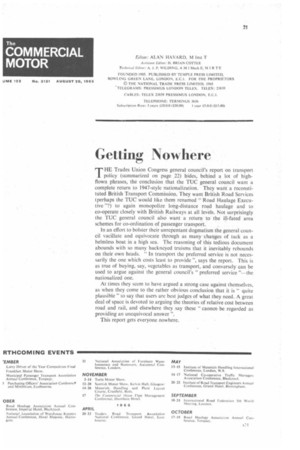Getting Nowhere
Page 23

If you've noticed an error in this article please click here to report it so we can fix it.
THE Trades Union Congress general council's report on transport policy (summarized on page ,22) hides, behind a lot of highflown phrases, the conclusion that the TUC general council want a complete return to 1947-style nationalization. They want a reconstituted British Transport Commission. They want British Road Services (perhaps the TUC would like them renamed Road Haulage Executive"?) tO again monopolize long-distance road haulage and to co-operate closely with British Railways at all levels. Not surprisingly the TUC general council also want a return to the ill-fated area schemes for co-ordination of passenger transport.
In an effort to bolster their unrepentant dogmatism the general council vacillate and equivocate through as many changes of tack as a helmless boat in a high sea. The reasoning of this tedious document abounds with so many hackneyed truisms that it inevitably rebounds on their own heads. " In transport the preferred service is not necessarily the one which costs least to provide ". says the report. This is as true of buying, say, vegetables as transport, and conversely can be used to argue against the general council's " preferred service "—the nationalized one.
At times they seem to have argued a strong case against themselves, as when they come to the rather obvious conclusion that it is " quite plausible" to say that users arc best judges of what they need. A great deal of space is devoted to arguing the theories of relative cost between road and rail, and elsewhere they say these "cannot be regarded as providing an unequivocal answer ".
This report gets everyone nowhere.




















































































































